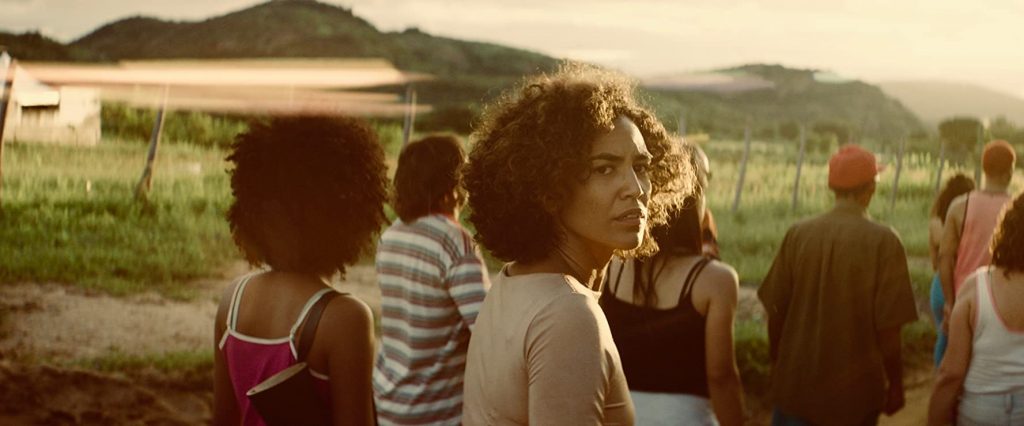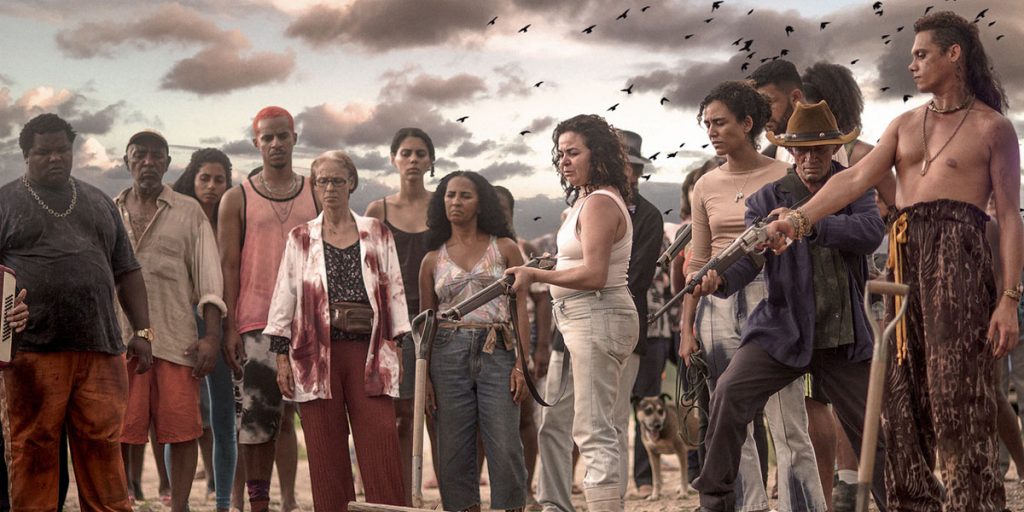Bacurau is a film for those into magic realism, science fiction, political and social critique, in the form of a classic Western parody set in Brazil’s outback.
“A few years from now…” is when and how Kleber Mendonça Filho and Juliana Dornelles’ newest and third film commences. In the Brazilian sertão (outback), a close-knit community mourns the loss of their beloved Carmelita, 94, matriarch and grandma to Teresa (Bárbara Colen), who we follow into the fictional village of Bacurau, which means ‘nighthawk’. Since Bacurau’s water supply was cut off by, presumably the neighbouring communities, in an attempt to lure their small village into complacency, we first meet a villager (Teresa) while she’s hitching a ride with the village’s watering truck to the scene of soon-to-be chaos and carnage.
Strange elements, such as drones in the shape of small UFOs, a truck selling coffins by the side of the road, or the mass-taking a mysterious pill, appear from the beginning as normal every day possibilties. With Bacurau, you’re never quite sure what is national and what is universal, just like you’re never sure of which way the narrative is heading nor you’re aware of the various significances of these peculiarities.
In fact, it is virtually impossible to describe Bacurau in just one catchphrase. This fantastical western is as comical in its mockery and mimickery of the classic Western genre, as it is gory a là Quentin Tarantino. It does not shy away from depicting the absolute horrors of human doing, both visually and metaphorically, and shares many thematic elements with films such as Parasite and Joker – Bacurau’s focus is on the abyss between the haves and have nots. In their film, Mendonça Filho and Dornelles combine classic Brazilian elements, such as the opening song by Tropicália singer Gal Costa to Brazil’s radical Cinema Novo movement of the 1960s. It describes a political fable which is, not quite so subtly, a critique of president Jair Bolsonaro.

Driven by an underlying moral seriousness, the directors have created in Bacurau a horrowing answer to a near-future where history’s outsiders fight back against those who are crushing them. In the second act of the film, the perpetuation of societal elements comes to a clash of civilizations when the villagers identify who’s behind the strange going-ons in the village, and rally up to battle against the American semi-hobbyist capitalist killers.
While drones disguised as flying saucers survey the villagers, unexpecting (and badly timed) tourists show up, a watering truck appears with mysterious bullet holes draining their supplies, the phone reception disappears, as well as their recognition on google maps (to name but a few of the main happenings to the village) – the villagers come together under a psychantropic drug and deal with this significance in their micro-cosmos. Indeed, the more pills the villages take, the hazier and fantastical the film becomes as well. Elements make less and less sense, while at the same time the red thread that binds them together becomes more and more visible.
The strangeness of the village itself, combined with the odd elements that are permeating throughout the film, is very much akin to Gabriel García-Márquez’s Macondo in his novel One Hundred Years of Solitude. The novel is considered as the image of the literary genre ‘magic realism’, where a realistic view of the modern world is painted while also adding magical elements. Once understood as part of the magic realism world, the various elements in Bacurau take on many layers of social, political critique while also displaying the various societal elements hidden in Brazil’s sertão.
The film makes you feel the human weight of people dying, and even more so under mysterious yet normalised circumstances. Despite its magic realism crossovers, Bacurau remains a film about Brazilian society in its current political and societal climate. The residents of Bacurau cover the spectrum of Brazil’s racial and trans diversity, which is also present in the variety of accents that can be heard in the film.
A distrust of governmental control also features in Bacurau: the villagers all loathe the mayoral candidate Tony Jr, who attempts to win their votes by bringing them half-expired food and dangerous medication. It is clear that parallels are made to Bolsonaro’s electorial campaign, and how small villages and communities are deemed dispensable and marginalised. The film grapples with classism and racism frankly, and explores how, despite their pale skin, wealth and European heritage, the privileged Brazilians aren’t considered equals by the modern-day colonizers. The plot and the Brazilian scene are both metaphorical and evident, they suppose a revolt of the poorer class (the villagers) against the rich capitalists (the Americans) in a time where it has often been questioned why Brazilians have accepted oppression without adversary.
In fact, if we follow Bacurau‘s connection to various other socio-historical themes, we can extend this metaphor to include a historic rematch of Brazilians against the colonizer. The final song laments “se alguém tem que morrer, que seja para melhorar” (Réquiem para Matraga by Geraldo Vandré), or “if someone has to die, it may be to improve” – referrring perhaps to a revolutionary concept in which in order to build something, the pre-existing system has to be extinguished. This is perhaps allegorical, as there are many more elements hinting towards this deeper layer of historical revolution. The village of Bacurau is in fact one of the many settlements originally founded by escaped enslaved people, a quilombo. In an interview with Film Comment, Mendonça Filho referred to it as a “remixed quilombo”: “a black community, a historical place of resistance, but with some white indigenous, trans and other inhabitants.” Societal elements such as the dancing of the capoeira (a combat dance that originated with enslaved Africans), which occurs about midway through, are both communicating with that history of defiance and readying for a new battle.
Bacurau encompasses a myriad of various genres and significant elements. It has Western symbolism, decanted in a sinister science fiction, magic realism, cult genre. It rebuilds the Western with local materials. Though fictional, the story of Bacurau and its little village community has a lot to tell, even if you are not able to pick up on all the details specific to Brazil. In the end, like the village elder who has recanted the village history and warnings, Bacurau teaches us what might be very necessary to remember in the future. “Se for, vá na paz” – “if you go, go in peace”.
Bacurau is now available to watch on digital and on demand. Read our review of Kleber Mendonça Filho’s Pictures of Ghosts!

